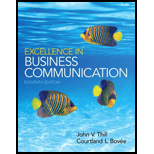
To critically think about:
Identify and analyze the message strategy suitable for a situation where an overcharge has occurred for a long term customer due to a glitch in the system, is sent to the customer.
Introduction:
Routine business messages:
In business communication, the routine messages check the “who, what, where, when, why, and, how” in an operation. This includes areas such as order confirmations, bug reports, contract terms, etc.
Positive business messages:
Includes the positivity in a business communication by being clear, encouraging, considerate, and straight to the point. This makes sure that the receiver interprets the intended message sent accurately and with a good mindset.
Negative business messages:
Messages that include delivering a bad news, making sure the receiver accepts the news, maintaining the benevolence of the reader, maintaining company reputation, and minimizing future correspondence on the matter.
Persuasive business messages:
Includes a situation where an attempt of changing someone’s attitudes, beliefs, or action is in consideration. These have a complex mix of listening, speaking, and tweaking the messages to align with the motivations of the audience.
Want to see the full answer?
Check out a sample textbook solution
Chapter 10 Solutions
Excellence in Business Communication (11th Edition)
- On the 1st of April 2018, the South African National Treasury increase the value-added tax rate from 14% to 15%. This policy change had a wide-ranging impact on society. Discuss some of the benefits and drawbacks of making use of this type of tax to generate government revenue and what we may expect in terms of its impact on inflation and GDP growth within the economy. Please use some of the economics graphs to explain some scenariosarrow_forwardI want to this question answer for Financial accounting question not need ai solutionarrow_forwardWant right answerarrow_forward
- Kanye Ridge Industries has a beginning finished goods inventory of $24,300, raw material purchases of $31,500, cost of goods manufactured of $42,700, and an ending finished goods inventory of $18,900. The cost of goods sold for this company is?arrow_forwardI need help with this solution and accountingarrow_forwardPlease explain the solution to this general accounting problem with accurate explanations.arrow_forward
 BUSN 11 Introduction to Business Student EditionBusinessISBN:9781337407137Author:KellyPublisher:Cengage Learning
BUSN 11 Introduction to Business Student EditionBusinessISBN:9781337407137Author:KellyPublisher:Cengage Learning Essentials of Business Communication (MindTap Cou...BusinessISBN:9781337386494Author:Mary Ellen Guffey, Dana LoewyPublisher:Cengage Learning
Essentials of Business Communication (MindTap Cou...BusinessISBN:9781337386494Author:Mary Ellen Guffey, Dana LoewyPublisher:Cengage Learning Accounting Information Systems (14th Edition)BusinessISBN:9780134474021Author:Marshall B. Romney, Paul J. SteinbartPublisher:PEARSON
Accounting Information Systems (14th Edition)BusinessISBN:9780134474021Author:Marshall B. Romney, Paul J. SteinbartPublisher:PEARSON
 International Business: Competing in the Global M...BusinessISBN:9781259929441Author:Charles W. L. Hill Dr, G. Tomas M. HultPublisher:McGraw-Hill Education
International Business: Competing in the Global M...BusinessISBN:9781259929441Author:Charles W. L. Hill Dr, G. Tomas M. HultPublisher:McGraw-Hill Education





